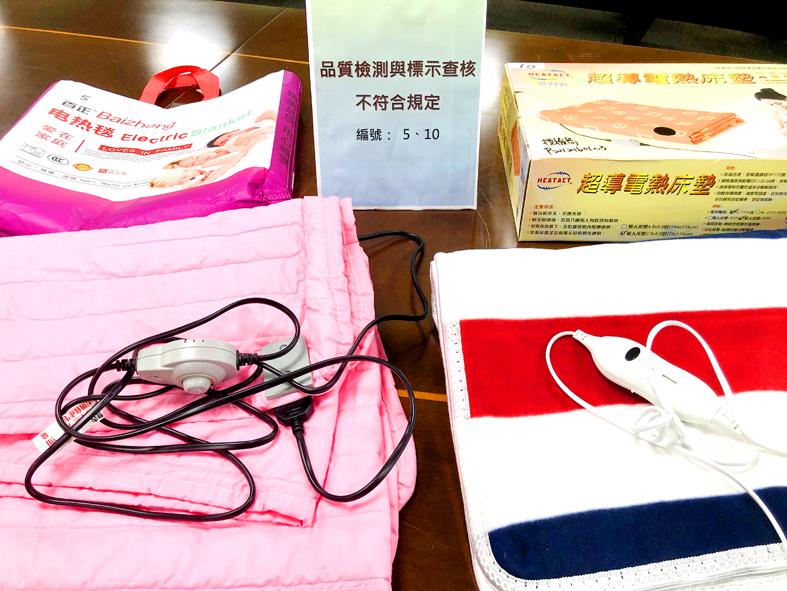Half of the electric blankets sold by online retailers in Taiwan failed inspections and could present a safety risk, the Executive Yuan’s Consumer Protection Committee said yesterday.
The increased popularity of electric blankets due to recent cold weather prompted the inspection, the committee said, adding that people should be cautious when buying such products from Chinese manufacturers.
One of the 10 products tested had not been put through safety certification testing, and the distributor was asked to correct the issue, committee director-general Liu Chin-fang (劉清芳) said.

Photo: Lo Chi, Taipei Times
“Electric blankets come into contact with the body, so they absolutely must pass safety testing before they can be sold,” she said.
Of the five blankets that failed inspection, two failed for quality problems, committee official Kao Tzu-chung (高賜忠) said.
The problems included electromagnetic interference that affected nearby electronics, as well as issues with the power connector, he said.
The blanket that had problems with its electrical plug was made in China for a double bed, and was sold on Momo for NT$828 (US$29.31), committee official Wang Te-ming (王德明) said.
The one that caused electromagnetic interference was a Taiwan-made product selling on Momo for NT$1,567, he said.
Other problematic products were found on PChome and Yahoo Shopping, he said.
Online platforms would be required to process claims for problematic products even if the seven-day grace period had passed, he said, citing stipulations in Article 359 of the Civil Code.
Meanwhile, the Bureau of Standards, Metrology and Inspection said that distributors of products that do not have safety certification could be fined between NT$250,000 and NT$2.5 million and must have the products certified within a set time limit.
Missing the certification deadline could result in an additional fine of NT$100,000 to NT$1 million, it added.

The Coast Guard Administration (CGA) yesterday said it had deployed patrol vessels to expel a China Coast Guard ship and a Chinese fishing boat near Pratas Island (Dongsha Island, 東沙群島) in the South China Sea. The China Coast Guard vessel was 28 nautical miles (52km) northeast of Pratas at 6:15am on Thursday, approaching the island’s restricted waters, which extend 24 nautical miles from its shoreline, the CGA’s Dongsha-Nansha Branch said in a statement. The Tainan, a 2,000-tonne cutter, was deployed by the CGA to shadow the Chinese ship, which left the area at 2:39pm on Friday, the statement said. At 6:31pm on Friday,

The Chinese People’s Liberation Army Navy’s (PLAN) third aircraft carrier, the Fujian, would pose a steep challenge to Taiwan’s ability to defend itself against a full-scale invasion, a defense expert said yesterday. Institute of National Defense and Security Research analyst Chieh Chung (揭仲) made the comment hours after the PLAN confirmed the carrier recently passed through the Taiwan Strait to conduct “scientific research tests and training missions” in the South China Sea. China has two carriers in operation — the Liaoning and the Shandong — with the Fujian undergoing sea trials. Although the PLAN needs time to train the Fujian’s air wing and

The American Institute in Taiwan (AIT) put Taiwan in danger, Ma Ying-jeou Foundation director Hsiao Hsu-tsen (蕭旭岑) said yesterday, hours after the de facto US embassy said that Beijing had misinterpreted World War II-era documents to isolate Taiwan. The AIT’s comments harmed the Republic of China’s (ROC) national interests and contradicted a part of the “six assurances” stipulating that the US would not change its official position on Taiwan’s sovereignty, Hsiao said. The “six assurances,” which were given by then-US president Ronald Reagan to Taiwan in 1982, say that Washington would not set a date for ending arm sales to Taiwan, consult

A Taiwanese academic yesterday said that Chinese Ambassador to Denmark Wang Xuefeng (王雪峰) disrespected Denmark and Japan when he earlier this year allegedly asked Japan’s embassy to make Taiwan’s representatives leave an event in Copenhagen. The Danish-language Berlingske on Sunday reported the incident in an article with the headline “The emperor’s birthday ended in drama in Copenhagen: More conflict may be on the way between Denmark and China.” It said that on Feb. 26, the Japanese embassy in Denmark held an event for Japanese Emperor Naruhito’s birthday, with about 200 guests in attendance, including representatives from Taiwan. After addressing the Japanese hosts, Wang